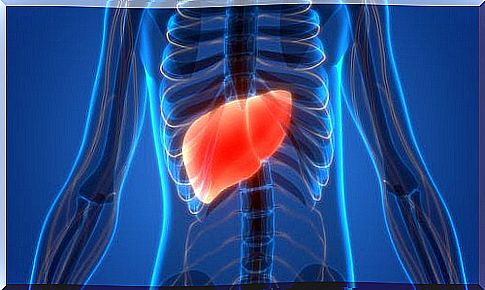Causes And Symptoms Of Liver Failure
The problem with liver failure is that it only shows symptoms when advanced, so we need to see the specialist as soon as possible to avoid major complications.

Liver failure occurs when the liver loses the ability to function normally and properly. It is a progressive problem that severely damages the liver.
Its evolution is not immediate, but rather develops over months or years.
Liver failure can be of two types: acute and chronic.
- In the case of acute insufficiency, functions are affected quite quickly.
- In chronic liver failure, problems appear slowly. So it may be a long time before you notice it.
Causes of liver failure
As with most serious illnesses, liver failure can be caused by several reasons. Take note of the main possible causes to find out if you are at risk for it.
If this is the case, consult your doctor immediately to eliminate any doubts.
The most common causes of liver failure are:
1. The presence of certain viruses
Throughout the day, we come into contact with a lot of elements and toxins that can damage our liver.
Some of these are viruses that can be acquired from different sources. The herpes simplex virus and hepatitis types A, B and E cause the most damage to the health of the liver.
2. Excessive use of drugs
Taking the right medication at the right time will definitely give you what you need to improve your health. However, exceeding doses or taking medicines that you do not need can cause liver failure.
The medications you should take special care of are:
- Nonsteroidal anti-inflammatory drugs
- Anti-convulsants
- Antibiotics
- Contraceptives
It often happens that some people increase the dose or frequency of their medications when they feel that the treatment is not having the desired effect.
Before making this decision, check with your doctor to see if it is really necessary to make any changes or if you simply do not notice their effects.
3. Consumption of harmful foods

Some of the foods we eat on a regular basis can carry small amounts of toxins. Therefore, you should be careful and identify which products are not suitable for you and try to follow a balanced diet.
- One of the most common foods in our diet, but which also contributes a small degree of toxins are mushrooms.
- When you consume mushrooms in large quantities and practice self-medication or carry a virus such as those mentioned above, the risk of liver failure increases.
4. Drinking too much alcohol
The last cause of liver failure is excess alcohol. While we already know that it’s best to limit these drinks as much as possible, the reality is, we don’t always do it.
However, someone who drinks alcohol several times a week is likely to put their liver at risk.
- It is recommended that you never consume more than two glasses per day. And if you do or plan to do so, include two glasses of water for each drink.
Symptoms of liver failure
Now that you know what the most common causes of liver failure are, it helps to know what their symptoms are.
It is important to take into account that the symptoms appear when the liver is already severely damaged. Therefore, the diagnosis of this problem in the early stages is usually difficult.
The most common symptoms are:
1. Changes in skin color
In liver failure, the skin turns slightly yellow. The cause is the excessive accumulation of bilirubin in the skin.
Since the liver cannot process bilirubin, it then builds up in the blood and pigments under the skin.
2. Abdominal pain

Regardless of the cause of liver failure, one of the most common symptoms is abdominal pain.
This is usually because the liver is growing from the inflammation and becoming more sensitive.
3. Indigestion
When liver failure begins to develop and causes severe damage to the liver, it stops producing bile. This is important because bile has a fundamental role in the digestive process.
When bile is not produced properly, food is not digested as it should and indigestion occurs.
4. Pale colored stools
The bile also gives the stool a brown color. Normally, the stools are brown in color.
However, if their appearance is white or very light in color, check that your liver is working properly.
When liver problems occur and the production of this fluid is limited, then changes in the color of the stool may be seen.
5. Jaundice
Jaundice is a disease that leaves no doubt that the liver is malfunctioning.
When this disease is present, the color of the skin turns yellow, and the white part of the eyes may also acquire a yellowish tint.
Liver failure should be treated as soon as your condition is known to avoid complications.
Treatment will depend on the reason that produced the liver failure and the symptoms presented.
But in any case, the most important thing is that you follow your doctor’s recommendations to the letter.
Main image © wikiHow.com









